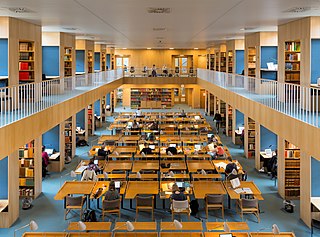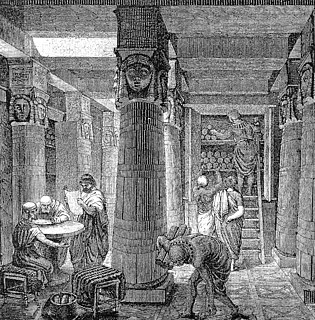Related Research Articles

A library is a collection of materials, books or media that are accessible for use and not just for display purposes. A library provides physical or digital access materials, and may be a physical location or a virtual space, or both. A library's collection can include printed materials and other physical resources in many formats such as DVD, CD and cassette as well as access to information, music or other content held on bibliographic databases.
Pro bono publico, usually shortened to pro bono, is a Latin phrase for professional work undertaken voluntarily and without payment. The term typically refers to provision of legal services by legal professionals for people who are unable to afford them.

Westlaw is an online legal research service and proprietary database for lawyers and legal professionals available in over 60 countries. Information resources on Westlaw include more than 40,000 databases of case law, state and federal statutes, administrative codes, newspaper and magazine articles, public records, law journals, law reviews, treatises, legal forms and other information resources.

The Federal Register is the official journal of the federal government of the United States that contains government agency rules, proposed rules, and public notices. It is published every weekday, except on federal holidays. The final rules promulgated by a federal agency and published in the Federal Register are ultimately reorganized by topic or subject matter and codified in the Code of Federal Regulations (CFR), which is updated annually.

WorldCat is a union catalog that itemizes the collections of tens of thousands of institutions, in many countries, that are current or past members of the OCLC global cooperative. It is operated by OCLC, Inc. Many of the OCLC member libraries collectively maintain WorldCat's database, the world's largest bibliographic database. The database includes other information sources in addition to member library collections. OCLC makes WorldCat itself available free to libraries, but the catalog is the foundation for other subscription OCLC services. WorldCat is used by librarians for cataloging and research and by the general public.
Legal research is "the process of identifying and retrieving information necessary to support legal decision-making. In its broadest sense, legal research includes each step of a course of action that begins with an analysis of the facts of a problem and concludes with the application and communication of the results of the investigation."

A law library is a special library used by law students, lawyers, judges and their law clerks, historians and other scholars of legal history in order to research the law. Law libraries are also used by people who draft or advocate for new laws, e.g. legislators and others who work in state government, local government, and legislative counsel offices or the U.S. Office of Law Revision Counsel and lobbying professionals. Self-represented, or pro se, litigants also use law libraries.

The following outline is provided as an overview of and topical guide to library science:

University of Illinois Chicago School of Law is a public law school in Chicago, Illinois. Founded in 1899, the school offers programs for both part-time and full-time students, with both day and night classes available, and offers January enrollment.
Shepard's Citations is a citator used in United States legal research that provides a list of all the authorities citing a particular case, statute, or other legal authority. The verb Shepardizing refers to the process of consulting Shepard's to see if a case has been overturned, reaffirmed, questioned, or cited by later cases. Prior to the development of electronic citators like Westlaw's KeyCite during the 1990s, Shepard's was the only legal citation service that attempted to provide comprehensive coverage of U.S. law.

The Law Library of Congress is the law library of the United States Congress. The Law Library of Congress holds the single most comprehensive and authoritative collection of domestic, foreign, and international legal materials in the world. Established in 1832, its collections are currently housed in the James Madison Memorial Building of the Library of Congress. Law staff rely on and utilize 2.9 million volumes of primary legal sources, 102.18 million microforms, 99,000 reels of microfilm, 3.18 million pieces of microfiche, and 15,600 tangible electronic resources, making it is the largest law library in the world.
Pro Bono Net is a US nonprofit organization based in New York City and San Francisco. The organization works in close partnership with nonprofit legal aid organizations across the United States and Canada, to increase access to justice for the millions of poor people who face legal problems every year without help from a lawyer. It does this by (i) supporting the innovative and effective use of technology by the nonprofit legal sector, (ii) increasing participation by volunteers, and (iii) facilitating collaborations among nonprofit legal organizations and advocates working on similar issues or in the same region. Founded in 1998 with a grant from the Open Society Institute, Pro Bono Net has developed a broad base of support from foundations, law firms, corporate sponsors and nonprofit partners alike, to build web platforms that offer powerful and sophisticated online tools to pro bono and legal aid advocates, and to provide critical legal information and assistance directly to the public. Its model has been adopted in 30 states and regions, reaching approximately two-thirds of the poverty population and lawyers in the United States.

A special library is a library that provides specialized information resources on a particular subject, serves a specialized and limited clientele, and delivers specialized services to that clientele. Special libraries include corporate libraries, government libraries, law libraries, medical libraries, museum libraries, news libraries. Special libraries also exist within academic institutions. These libraries are included as special libraries because they are often funded separately from the rest of the university and they serve a targeted group of users.
Legal research is the process of identifying and retrieving information to support legal arguments and decisions. Finding relevant legal information can be challenging and may involve the use of electronic research tools as well as printed books and materials. However, many resources that are useful for legal research are fee-based, and many are not easily accessible.
The National Clearinghouse for Science, Technology and the Law at Stetson University College of Law is an organization that provides information sharing and professional development to forensic scientists, lawyers, judges, other legal professionals, law enforcement personnel, educators, and the general public. Sponsored by a grant from the National Institute of Justice, NCSTL offers educational programs and a database of forensic-related information. Within the context of the promotion of justice based on sound science and technology, NCSTL focuses on raising awareness and fostering communication and understanding among the various parties interested in scientific evidence and expert testimony.

Library science is an interdisciplinary or multidisciplinary field that applies the practices, perspectives, and tools of management, information technology, education, and other areas to libraries; the collection, organization, preservation, and dissemination of information resources; and the political economy of information. Martin Schrettinger, a Bavarian librarian, coined the discipline within his work (1808–1828) Versuch eines vollständigen Lehrbuchs der Bibliothek-Wissenschaft oder Anleitung zur vollkommenen Geschäftsführung eines Bibliothekars. Rather than classifying information based on nature-oriented elements, as was previously done in his Bavarian library, Schrettinger organized books in alphabetical order. The first American school for library science was founded by Melvil Dewey at Columbia University in 1887.

Public.Resource.Org (PRO) is a 501(c)(3) non-profit corporation dedicated to publishing and sharing public domain materials in the United States and internationally. It was founded by Carl Malamud and is based in Sebastopol, California.
The law of the U.S. state of Georgia consists of several levels, including constitutional, statutory, and regulatory law, as well as case law and local law. The Official Code of Georgia Annotated forms the general statutory law.

Public law libraries provide access to primary legal sources and secondary sources used in legal matters. In most U.S. states, public law libraries are part of the trial court system, a department of the state or county government, or an independent local government agency managed by a board of trustees. Public law libraries serve several user groups with different information needs: judges and their support staff, attorneys in all types of practice, and the general public.

Legal technology, also known as Legal Tech, refers to the use of technology and software to provide legal services and support the legal industry. Legal Tech companies are often startups founded with the purpose of disrupting the traditionally conservative legal market.
References
- ↑ Elefant, Carolyn (22 October 2006). "Sabrina Pacifici To Speak At DC Bar Event". My Shingle. Retrieved 4 December 2021.
- ↑ "Sabrina Pacifici". Movers & Shakers 2006. Library Journal. May 21, 2010. Retrieved 4 December 2021.
...adjunct faculty at the University of Maryland's Center for Information Policy....2004 'Blawggie' award for Best Overall Legal Blog...Degree: MSLIS, Catholic University of America, 1982......
- ↑ "Law Library Resource Xchange L L C". Trademarks & Logos. uspto.report. Retrieved 3 December 2021.
USPTO.report is not affiliated with the US Patent and Trademark Office. All data available is from public sources.
- ↑ "LLRX for Law Students". Library Blog. Brooklyn Law School. 9 November 2012. Retrieved 3 December 2021.
a free Web journal that Founder, Editor and Publisher Sabrina I. Pacifici established in 1996....LLRX is a definitive online reference guide for legal research which has monthly columns for lawyers, law librarians, and others with helpful legal research and legal technology information.
- ↑ Canadian Association of Law Libraries
- ↑ "Legal Tools". The Civil Rights Project. UCLA. 2010. Archived from the original on November 5, 2021. Retrieved 4 December 2021.
- ↑ Krenelka Chase, Ashley (11 March 2014). "Making the most of free legal research: a selected annotated bibliography". Reference Reviews. 28 (3): 6–10. doi:10.1108/RR-11-2013-0282 . Retrieved 3 December 2021.
LLRX (Homepage of Law Library Resource XChange). www.llrx.com. LLRX is a free, online resource that is published by a single individual
- ↑ Duffey, Diane; Potter, Theodore A. (June 2003). "Using the Internet for Case Preparation". Wisconsin Lawyer. State Bar of Wisconsin . Retrieved 3 December 2021.
a site maintained by professional and knowledgeable law librarians. It offers two compilations of useful information for trial preparation: court rules and jury instructions
- ↑ Frye, Nanna K. "Database Password Theft: A Lesson on Monitoring Billing & Preventing Loss". LLRX. Archived from the original on 12 February 1998. Retrieved 3 December 2021.
- ↑ Louis-Jacques, Lyonette. "How Not To Waste Time On The Internet: Efficient Use Of The Internet For Legal Research". www2.lib.uchicago.edu. Archived from the original on September 22, 1999. Retrieved 3 December 2021.
- ↑ McMillan, Dan (2000-09-24). "harnessing in-house intranets: Campaign asks lawyers to lavish poor with service". Portland Business Journal. bizjournals.com . Retrieved 3 December 2021.
- ↑ Law Search - Southern Illinois University School of Law
- ↑ "U.S. Code, Regulations, and Court Rules - Health Law Research Guide - Research Guides". Elisabeth Haub School of Law . Pace University . Retrieved 3 December 2021.
Court Rules, Forms, and Dockets: Over 1,400 browsable and searchable sources for state and federal court rules, forms and dockets from Law Library Resource Xchange, LLC.
- ↑ "Free Internet Legal Resources Portal". Charleston School of Law . Retrieved 3 December 2021.
- ↑ "General Legal Research Resources and Indices". Palm Beach Chapter. Florida Association for Women Lawyers. Retrieved 3 December 2021.
- ↑ "Links: Here are some helpful links". The Association of the Bar of the United States Court of Appeals for the Eighth Circuit. Archived from the original on May 11, 2021. Retrieved 3 December 2021.
- ↑ "Best of the Web". The New York Public Library . Retrieved 3 December 2021.
- ↑ "LLRX.com: Law and Technology Resources for Legal Professionals". Awards & Grants. American Library Association. 2009. Retrieved 3 December 2021.